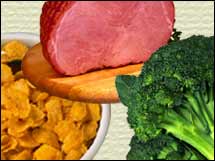Fixing the food fiascoSome experts see a 'food czar' as the way to rebuild trust in the nation's troubled $1 trillion food industry.NEW YORK (CNNMoney.com) -- While the food industry hasn't had a 9/11 moment, at least not yet, lawmakers are reacting to recent problems with the food supply in ways similar to when terrorists attacked America nearly six years ago. There have been congressional hearings, with the full complement of hand-wringing and tales of woe from victims, calls for reform, and then the hope for the magic bullet in the form of a central authority to solve some of our most pressing food problems.
So has come the increasing cry for a national "food czar," whose department would oversee the 15 or so agencies that rule the sector. Like the Office of Homeland Security created after the 2001 attacks, the new department would seek to unite the many disparate interests that hold sway over a vital part of the economy - the nation's $1 trillion food industry. "To get back the public's confidence, I think the government should have a real food czar, one that is only reportable to the president of the United States - a Cabinet-level position," said Dr. Philip Tierno, director of microbiology at New York University Medical Center and a member of Rudy Giuliani's post-9/11 task force on bioterrorism. "I think enough consecutive events have occurred to make the public really afraid at this time." Recent surveys have shown a marked decline in consumer confidence regarding the food supply. The Food Marketing Institute, an industry group, reported that 66 percent of Americans said they were "completely" or "somewhat" confident in supermarket food, down sharply from 82 percent in 2006. Tierno said the produce business in particular has fallen badly behind its counterparts in the meat and dairy industries in terms of product safety and needs modernization and closer supervision. He said the food industry should appoint an overseer itself until the government acts. Tierno and other experts believe a major catastrophe is inevitable if the food industry doesn't take significant strides towards reform. Indeed, the industry for months has been frying over a hot flame with a wide array of problems, ranging from peanut butter to pet food. Spinach has been linked to E. coli, and people in several states got sick from food they ate at Yum! Brands (Charts, Fortune 500)-owned Taco Bell. Congressional leaders have called for a massive overhaul of both the U.S. Department of Agriculture and the Food and Drug Administration. Rep. Rosa L. DeLauro (D-Conn.) is among the lawmakers who believe it is time to centralize oversight. But she sees a recent move in that direction by the FDA as merely adding another layer of wasteful bureaucracy. In early May, the FDA appointed David Acheson as its food safety czar - his official title is "assistant commissioner for food protection" - and said his duties would be both to prevent and respond to food scares. But Acheson can act only within the FDA's purview, meaning he holds no authority over the beef, poultry and dairy industries governed by the USDA. DeLauro said Acheson's position will do little to attack the root causes of the problems plaguing the nation's food supply - lax import standards, inadequate labeling, poor sanitary practices. "These new responsibilities could have been added to the current FDA structure with minimal disruption instead of creating another bureaucratic layer and diverting resources from other important matters in the agency," she said in a statement. The White House did not respond to several requests for comment. Under one roof Reform advocates like DeLauro and Tierno envision a separate single agency that would standardize the way the nation monitors, inspects and labels food. In addition, it would establish a tracking system so that regulators as well as consumers know the exact national origin of what they are consuming. Like Homeland Security, the new agency would coordinate the activities of all the other departments that oversee the food supply. The agency would be called the Food Safety Administration, under a bill proposed earlier this year by DeLauro and Sen. Dick Durbin, an Illinois Democrat who introduced similar legislation in the Senate. Not everyone in the field, though, believes that a centralized agency will be able to solve the problem. William Hallman, director of the Food Policy Institute at Rutgers University, said the industry itself is so diverse that the best place to make sure food is safe is at the source. To that end, the industry has devised a number of ways to detect microbial and chemical contamination, and needs to continue to make strides, Hallman said. "Ultimately regulation can only get you so far," he said. "You can't check everything. It really comes down to knowing where your food comes from and trusting that source." Dennis Krause, agribusiness senior vice president at GE Lending, praised the industry for developing new ways to monitor safety but also recommended better practices to trace food origins. He warned that there could be costs associated with a new food safety agency, though some other experts said consumers probably would feel little impact. |
Sponsors
|

